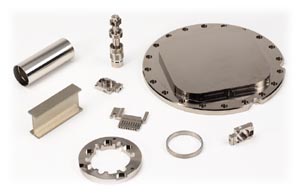Metal plating is a manufacturing process in which a thin layer of metal is deposited onto a substrate. Metal plating provides many benefits to products made from metal and other materials. By plating a substrate with a precious or semi precious metal, we are able to accomplish desired attributes such as providing corrosion and heat resistance, improving solder ability and conduction along with increasing the strength and hardness of a material.
Metal plating can and is also used for aesthetics on pieces such as antiques. This allows your pieces to maintain their luster despite their years.
Metal plating and metal plating services have been around for hundreds of years. This process is crucial for modern technology. There are several plating methods and many variations.
Metal Plating Types
There are many different processes or types of metal plating. All of these process types are regulated under metal finishing standards. These standards feature different technologies, steps of operation, as well as different inputs and output types.
Here are some of the more common types of metal plating:
Electro Plating
Electroplating is a process that uses electrical current to change the surface properties of a metal part by driving the chemical reaction by reducing metal ions. It is also called “electrodeposition”. Basically, this method uses electricity to coat a relatively mundane metal like copper with a more precious metal like gold or silver.
In the process of this method, the substrate first receives an electrical charge before it is immersed in a solution of the desired metal finish.
Electroless Plating

Examples of substrates plated with bright nickel using the electroless process
Electroless plating is a method that does not use an external source to generate electricity in its process. Instead the reaction needed to adhere the metal to the part happens chemically in the solution itself. This is referred to as “auto catalytic”.
This type of metal plating offers the distinct advantages of even coating on surfaces with high flexibility in plating thickness and volume. This process is especially great for plating odd shaped parts and parts with recess and blind holes. No complex filtration is required and finishes of matte, semi-bright and bright can be achieved.
Chemical Film Processing
Chemical Film Processing, also known as and referred to as alodine or iridite, is a chemical conversion coating that protects aluminum substrates from corrosion. Chemical film processing is a good choice for parts needing a base coating before the final plate is applied as it increases adhesion properties of the substrate while leaving object dimensions unchanged. Chemical Films are applied by brushing, spraying or dipping.
Mid Atlantic Finishing Corp., a offers the following metal plating services nationwide:
Gold Plating Services, Silver Plating Services, Tin Plating Services, Tin-Lead Plating Services, Electroless Nickel Plating Services, Bright Nickel Plating Services, Sulfamate Nickel Plating, Copper Plating Services, Chemical Film Plating Services, and Precision Masking Services.
MAF is committed to the delivery of quality products to every segment of our customer base, a fundamental element of our Company’s Purpose and Mission.
MAF is committed to full compliance with all the requirements of NADCAP AC 7004; AC 7108.


